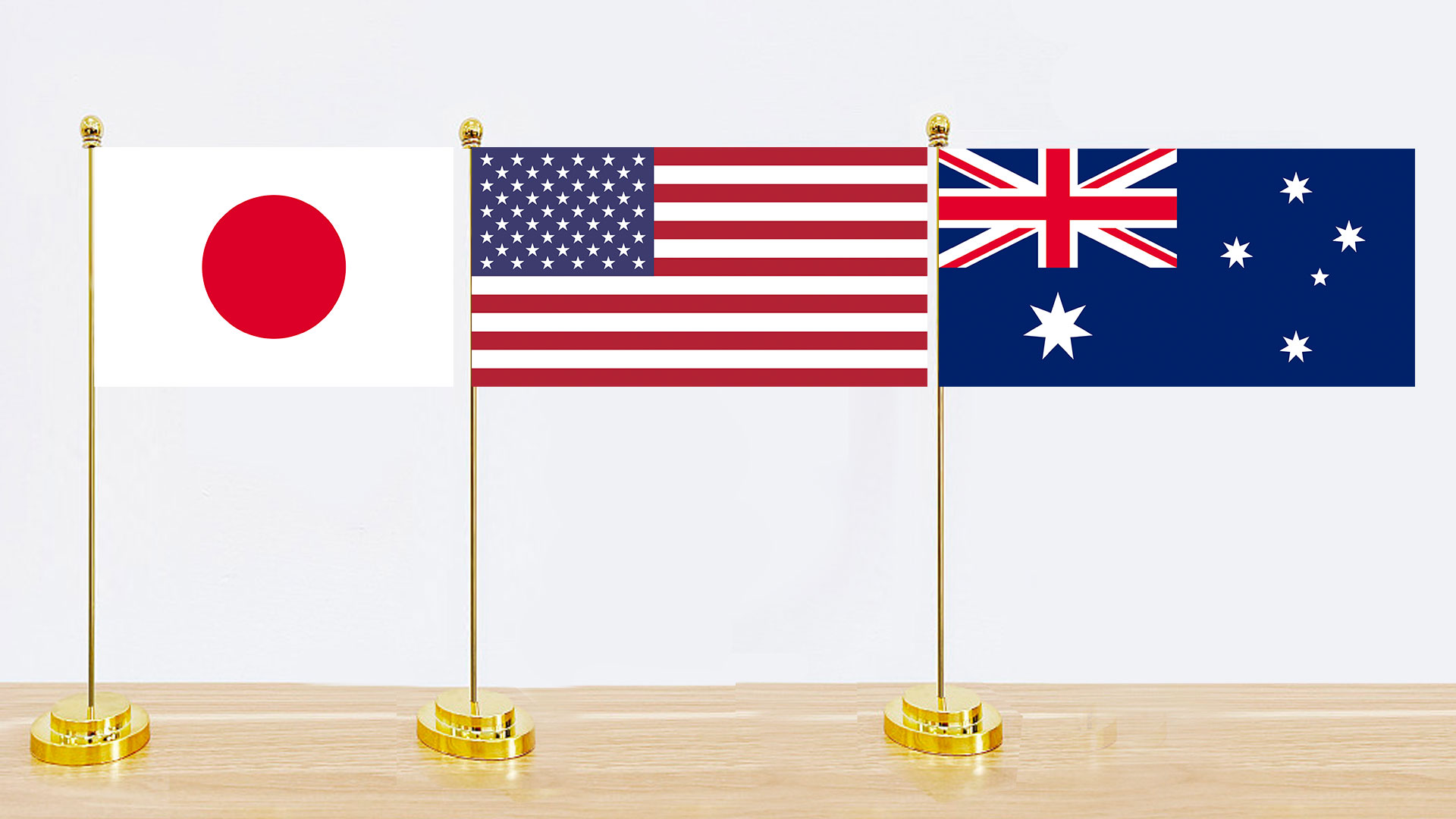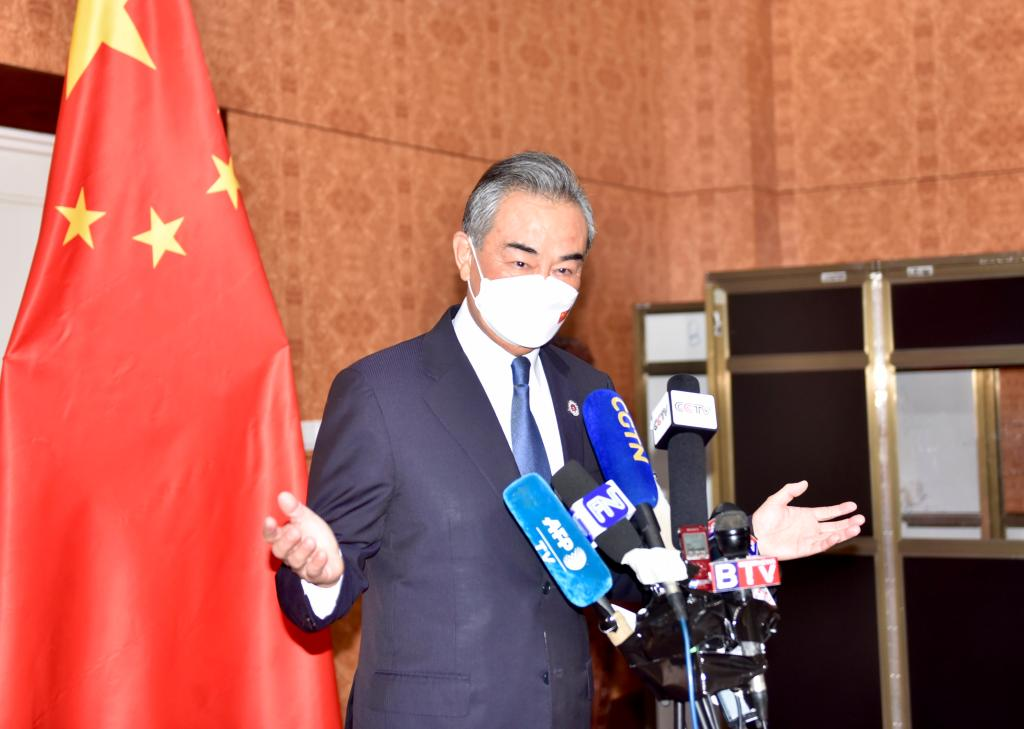
Editor's note: Hannan Hussain is a foreign affairs commentator and author. He is a Fulbright recipient at the University of Maryland and a former assistant researcher at the Islamabad Policy Research Institute. The article reflects the author's opinions and not necessarily the views of CGTN.
On October 1, the defense ministers of the United States, Japan and Australia gathered for a Trilateral Defense Ministers Meeting (TDMM) in Hawaii. Leaders vowed to work against China, falsely accusing the country of acting with "aggressive and bullying behavior" and issuing an unwarranted condemnation of Beijing's legitimate peace measures in the Taiwan Strait.
The three countries appear keen to promote a divisive "Indo-Pacific strategy" by maintaining anti-China posturing at its core. "We are deeply concerned by China's increasingly aggressive and bullying behavior in the Taiwan Strait, and elsewhere in the region," said U.S. Defense Secretary Lloyd Austin.
Attempts to advance military interference in the Pacific through confrontational rhetoric reveal underlying fractures. For instance, it is not Beijing but the U.S. and its partners who continue to face resistance over their pursuit of dangerous nuclearization efforts. That ominous trajectory on nuclear submarines, deliberated by Australia and the U.S., is glaring proof that the real source of "destabilizing military activities" stems from within the alliance, not with China.
It shows in Australian Defense Minister Richard Marles' open endorsement of AUKUS, who overlooked its huge costs to regional nonproliferation, and instead welcomed the prospect of nuclear-powered submarine acquisition in the future. All this is a painful contrast to Washington's groundless allegations of "aggressive" and "escalatory" Chinese military activities in the region. One should recall that military interference in the Pacific runs deep within the alliance: emphasis on advancing "force posture initiatives" in the Indo-Pacific removes all doubt.
Saturday's talks should also be considered the latest attempt by the U.S. and allies to distort the situation in the Taiwan Strait. Groundless allegations that China is trying to forcefully "shape the world"would stand no chance in pushing Washington's Indo-Pacific containment agenda any further.
As recently as August, China warned against all risky movements that undermine peace in the Taiwan Strait. That makes it imperative to push back against false alarms, as well as the defense alliance's attempts to pivot external interference in that direction.

Chinese State Councilor and Foreign Minister Wang Yi holds a press conference for Chinese and foreign media to expound on China's position on the Taiwan question after attending the meetings of foreign ministers on East Asia cooperation in Phnom Penh, Cambodia, August 5, 2022. /Xinhua
Chinese State Councilor and Foreign Minister Wang Yi holds a press conference for Chinese and foreign media to expound on China's position on the Taiwan question after attending the meetings of foreign ministers on East Asia cooperation in Phnom Penh, Cambodia, August 5, 2022. /Xinhua
Interestingly, the refusal by U.S., Japan and Australia to come to terms with China's peaceful rise underlines an alliance in peril. On regional peace, the irony is that the same alliance wishes to confine the determinants of a "global" rules-based order for its own three ranks. Accordingly, there is a dire need to refocus critical scrutiny on matters of genuine concern. That includes Austin's endorsement of "warfighting capability" with Australia in the region, shattering the myth of safeguarding regional stability.
As long as the fractured alliance holds a "cold war" view of China and the Pacific region, there is no case for genuine peace. Asia's free and independent sense of engagement is wrongly perceived by the trio as an opportunity to cultivate bloc partnerships, and focus their energies on confronting so-called adversaries. This perspective takes a beating on the maritime front, since there is a strong historical and legal basis that informs on matters of sovereignty in independent waters. On the other hand, a self-imposed "rules-based order only threatens region-wide peace.
"Today the international community is faced with the severe security environment due to … China's unilateral change of status quo by force in the South and East China seas," said Japanese Defense Minister Yasukazu Hamada during the talks.
Yet, it is Tokyo that has joined Washington and Canberra in pushing for an alternative maritime rules-based order through the Quadrilateral Security Dialogue. Moreover, the defense alliance can't legitimize its cosmetic support for international law by bashing Beijing. Actually, China's sovereignty, maritime rights and corresponding interests in the seas are consistent with the provisions of the United Nations Convention on the Law of the Sea (UNCLOS). Any attempt to use "freedom of navigation" to distort the convention's spirit demands outright opposition.
Taken together, the U.S.-backed defense alliance once again places a premium on posturing against China, and treats defense and military interference in Asia as pathways for peace. But this closed grouping of three is devoid of a regional consensus to back its hostile containment agenda. There is no chance that it will succeed in projecting its own weaknesses on to Beijing.
(If you want to contribute and have specific expertise, please contact us at opinions@cgtn.com. Follow @thouse_opinions on Twitter to discover the latest commentaries on CGTN Opinion Section.)